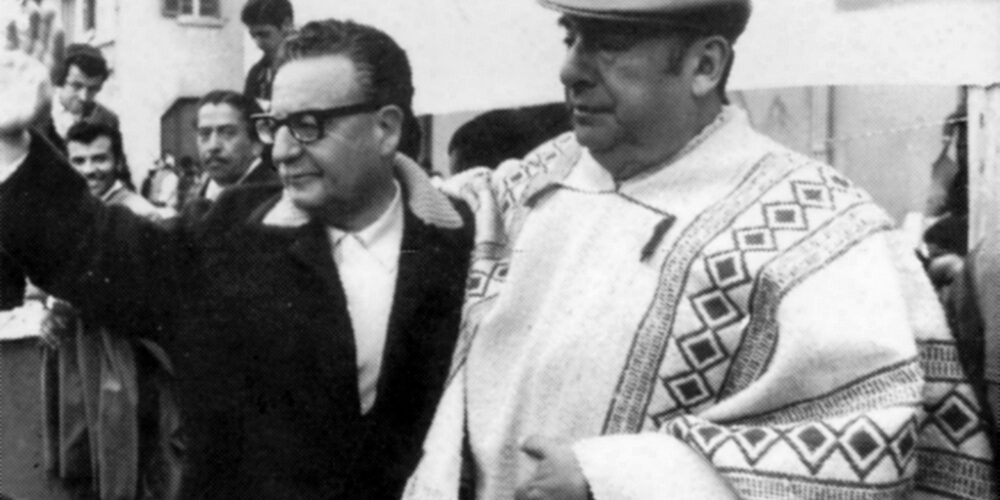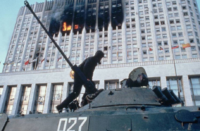In his acceptance speech for the Nobel Prize for Literature, Pablo Neruda describes his escape from the Chilean government of Jorge Videla across the Andes to Argentina.
The arduous and dangerous trek through this primeval world becomes a parable of humanity’s path through its own history and present, a world that, despite the greatest dangers, is also always determined by the solidarity of the common people. His guides guard Neruda like their greatest treasure. In this solitude they encounter others who offer them shelter and food, indeed nature herself cares for their well-being. This inherent connection between nature, history and working people is the paramount theme of Neruda’s poetry.
Neruda was born Ricardo Eliécer Neftalí Reyes Basoalto on 12 July 1904 in Parral, central Chile. His father, a driver of a ballast train on the emerging railway, takes him on journeys through the region, and so he witnesses the hard physical labour of the railwaymen. This experience of primeval nature shapes Neruda’s poetry and later defines the essence of the nature poems in Canto General.
His father, however, is unhappy with Neftalí’s literary interest, and tensions ultimately lead to the young poet changing his name to Pablo Neruda at the age of sixteen. In 1923 he publishes a first collection, Book of Twilights, followed in 1924 by Twenty Love Poems and a Song of Despair.
Following the First World War, labour struggles in Chile increase significantly, with strikes and demonstrations as well as clashes with the police. The Communist Party, founded in 1911, could build on the vibrant FOC (Chilean Workers’ Federation); and the communist movement in Chile was to become one of the most active in Latin America, thanks to the long tradition of trade union struggle in the copper and nitrate mines.
Ibáñez del Campo takes over the presidency in 1927. As minister of the interior, Ibáñez had commanded mass arrests and declared his aim as purging the country of “anarchists and communists.” Neruda enquires about a diplomatic career. In 1927 he is posted to Rangoon, followed by Colombo, Singapore, and Java, returning to Chile, now married, in 1932. Chile is ruled by the new dictator, Carlos Dávila.
In 1933 Neruda is appointed vice-consul in Buenos Aires. Here he meets and befriends Federico García Lorca. In 1934 he is appointed consul to Spain, where the political situation is seriously deteriorating. In addition to Lorca, Neruda is acquainted with other leading poets of the time: Alberti, Hernández, Guillén. Neruda meets his second wife, Delia del Carril, a communist, and increasingly moves towards a communist position.
Franco’s coup in July 1936 is followed by repression, in August Lorca is murdered, and the Spanish Civil War begins. In Spain in Our Hearts (1937) Neruda eloquently and unequivocally sides with the Spanish Republic:
Come and see the blood on the streets, Come and see The blood on the streets, Come and see the blood On the streets.
In 1936 he meets Louis Aragon and Paul Éluard in Paris and organises and attends the Second International Writers’ Congress in Defence of Culture, after which Neruda and Delia return to Chile and Neruda completes Spain in Our Hearts.
Spain’s blood triggers the memory of the tortured people in the history of South America; memory emerges as a central function of poetry, with the poet as witness. Memory becomes the constituent principle of the Canto General, completed underground ten years later.
The theme of Canto General is history: nature becoming human, the history of South America, the liberation movements, and the anti-imperialist struggle. The people become the protagonists of the historical process, beginning with the working people of Machu Picchu, descendants of the Incas.
In early 1939 the democratic president Aguirre Cerda appoints Neruda to facilitate the immigration of Spanish refugees. Neruda ensures the flight of about two thousand Spanish people to Chile.
After the Nazi invasion of the USSR, Neruda actively supports the Soviet Union and writes “Song for Stalingrad,” which deals with the common experience of the besieged, their resistance.
Neruda visits the Peruvian Inca site of Machu Picchu, which has a lasting effect on him. In 1945 he joins the Communist Party and supports the centre-left presidential candidate Videla in 1946, who a year later persecutes progressive forces and brutally suppresses trade unions. Encountering struggling miners, Neruda realises that art must be understood by the masses.
In 1948 political persecution forces him underground for about a year. He finishes Canto General. In late February 1949 he flees across the Andes to Argentina, then escapes to Europe, journeys to many socialist countries, and begins a relationship with Matilde Urrutia, who becomes his third wife.
The 20th Congress of the Communist Party of the Soviet Union and China’s Cultural Revolution cast a shadow over Neruda’s unconditional support for all aspects of existing socialism, but it never affects his full commitment as a communist to a humane future. The 1950s also witness the Cuban Revolution, and Neruda hails it with his collection Song of Protest.
From 1969 Neruda is actively involved in the election campaign for Salvador Allende, who wins the election in September 1970. In 1971 Neruda receives the Nobel Prize for Literature. In November 1972 he returns to Chile seriously ill. On 11 September 1973 he hears news of the putsch, and the death of President Allende.
Pablo Neruda dies on 23 September. His funeral becomes the first manifestation of popular revolt:
When someone in a loud voice began to shout: “Comrade Pablo Neruda!” we all answered “Present!” . . . Then suddenly, the cry was “Comrade Victor Jara!” All at once, our voices cracked: . . . “Present!” . . . “Comrade Salvador Allende!” . . . “Present!
In February 2023 an international team of forensic science experts found that Neruda had been poisoned, on the orders of the junta.






